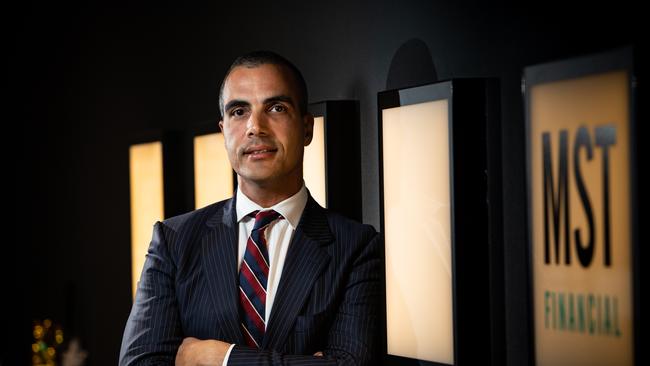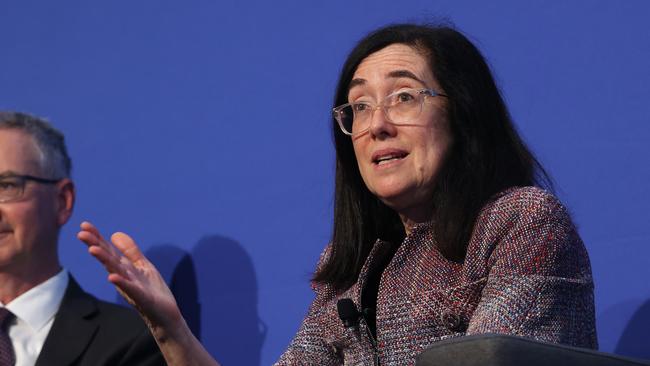
Some conservative Americans are working out whether and how to get their money out of the country before disaster strikes.
Business likes certainty and Trump is the antithesis, even if his supporters say his programs will translate into longer term growth.
His attack on the multilateral trade system means his impact is global.
The federal election in Australia just adds to the caution on the local bourse after an anaemic budget. In the past six weeks an overvalued equities market has dropped 600 points or circa 9 per cent and is now trading at around 18.5 times forecast earnings.
There are some positives which may be lost on some investors.
UBS strategist Richard Schellbach has noted 34 per cent of the ASX 200 is now comprised of what he calls growth stocks, up from 23 per cent in 2018, or a third of the market.
After struggling last year, income stocks are also back in vogue in these uncertain terms as outlined recently by MST’s Hasan Tevfik.
Bank deposits are no longer safe havens, so alternatives are being sought and the field is wider than high-dividend paying bank stocks.
A portfolio of the top dividend yield stocks returned just 1.3 per cent last year against an ASX 200 that returned 11.4 per cent.

In the first two months of this year the top quintile of dividend yielders have returned 2.5 per cent while the ASX 200 provided a total return of just 60 basis points before slipping into negative territory on price terms.
Tevfik explains the return of income stocks by moves in bond yields – last year bond yields in Australia increased. The Aussie five-year bond yield rose 32 basis points but fell by 12 basis points for the first two months of 2025.
Yield investing has worked best when bond yields are falling and this has certainly been the case more recently too. Tevfik figures “the combination of a weakening global growth outlook and further RBA rate cuts should mean lower Aussie bond yields in the medium term”.
MST’s ideas for good income-producing stocks include Vicinity, Origin, Challenger, JB Hi-Fi and Steadfast.
Tefvik drew a line under stocks with a dividend yield below the market’s median yield of 3.2 per cent and his advanced income strategy is headlined by Origin at 5.8 per cent and Vicinity, followed by BOQ. He avoids stocks that issue too much equity because that reduces earnings per share and by definition rely on external capital to fund growth instead of internally generated funds.
Goldman’s Matt Ross includes one flyer on his list, US-based boutique investment manager GQG Partners, along with Aurizon, Ampol, Rio and Santos.
GQG is not for the faint of heart, a classic buy-the-dip scenario, given the stock has fallen some 23 per cent in the past few months as global stock markets have wobbled.
But funds under management last year rose 45 per cent to $US148.2bn ($235.6bn) and revenues by 47 per cent
Shellbach is stressing the more growth-oriented focus of the ASX 200 as offering appeal some international investors have failed to grasp, now outpacing value stocks.
The market has changed.
Since 2004 banks’ share of the ASX 200 has slipped from 27.4 to 26.1 per cent, resources have stayed flat at just over 22 per cent, food and beverage has slipped from 4 per cent to 0.8 per cent but healthcare has exploded from 2.8 per cent to 9.8 per cent and info tech from 0.5 per cent to 3.3 per cent. In early 1980s miners accounted for 80 per cent of the ASX value, now they are 22 per cent.
Decision delayed
The Australian Competition and Consumer Commission has yet again delayed the expected rejection of Qube’s $332.5m purchase of the Norway-based Wallenius Wilhelmsen’s roll-on roll-off car port facilities and accompanying land in Melbourne.
The facilities match those already owned by Qube in Port Kembla and Brisbane, with the deal giving it virtual monopoly control of Australian car imports.
The decision due last Thursday is now expected on April 10 after more questions.
This will be around 10 months after Qube first applied for clearance last June, having announced the deal last May.

Qube is a long-time client of ACCC chair Gina Cass-Gottlieb’s old firm Gilbert & Tobin and has offered behavioural undertakings to offset the clear market control.
These are generally not favoured by the regulator and the question of market control just happens to be the ACCC’s stated focus in its new compulsory notification-based merger regime.
The ACCC has publicly rejected just six merger deals in Cass-Gottlieb’s three years at the helm, a further seven were withdrawn after concerns were raised, and 16 were accepted after undertakings and other modifications.
The figures don’t include mergers which didn’t happen with knowledge of the rules.
Political process
The fact federal Treasurer Jim Chalmers slipped out the ACCC treatise on supermarkets underlines the political process.
The ACCC has of course already issued proceedings against Coles and Woolworths for alleged dodgy discounts but its report provided no smoking gun because maybe there isn’t one to be found.
Full credit to the ACCC then for not making up a yarn to satisfy Chalmers.
Election aside, the Treasurer has some work to do to increase transparency around the code to give perishable fruit and vegetable growers a better deal and better notice for consumers. These need changes to the code by Chalmers if he actually accepts the ACCC’s recommendations.
The bad news of course is Chalmers has already given the ACCC control of the supermarket code, which means small suppliers have to fight the bureaucracy to get heard.
An informal settlement process gave the small suppliers at least a chance of being heard.
Critical deals
Australia’s strength in critical minerals is underlined by the fact deals listed on the ASX in the sector are more than double that of its nearest rival, Toronto.
The relative strength of the sector is obviously part of the story, but the ASX has proved a happy stamping ground for raising capital in a field in which private capital rarely plays.
According to the International Energy Agency, Australia has 6 per cent of the world’s known critical mineral reserves, well behind China at 48 per cent, Brazil at 23 per cent and India at eight.
Demand for rare earths is tipped to increase 62 per cent by 2040 if countries meet their climate pledges and demand for nickel will be up 73 per cent, cobalt by 80 per cent and lithium by 400 per cent.
The case for more minerals processing is shown by China which has 23 per cent of global copper production and 44 per cent of refined copper.
Investor support clearly helps.
Macquarie Capital is a key player in capital raising having led on 24 per cent of the deals in the sector over the past five years.
The sector has emerged a potential bargaining chip with the US as President Trump attempts to overthrow the multilateral trading system with his campaign of unilateral tariff hikes.
But everyone has learned expected behaviour and President Trump are oxymorons.




US President Donald Trump came to power to make the country great again but the initial business enthusiasm has given way to outright fear on the bourse and across business.